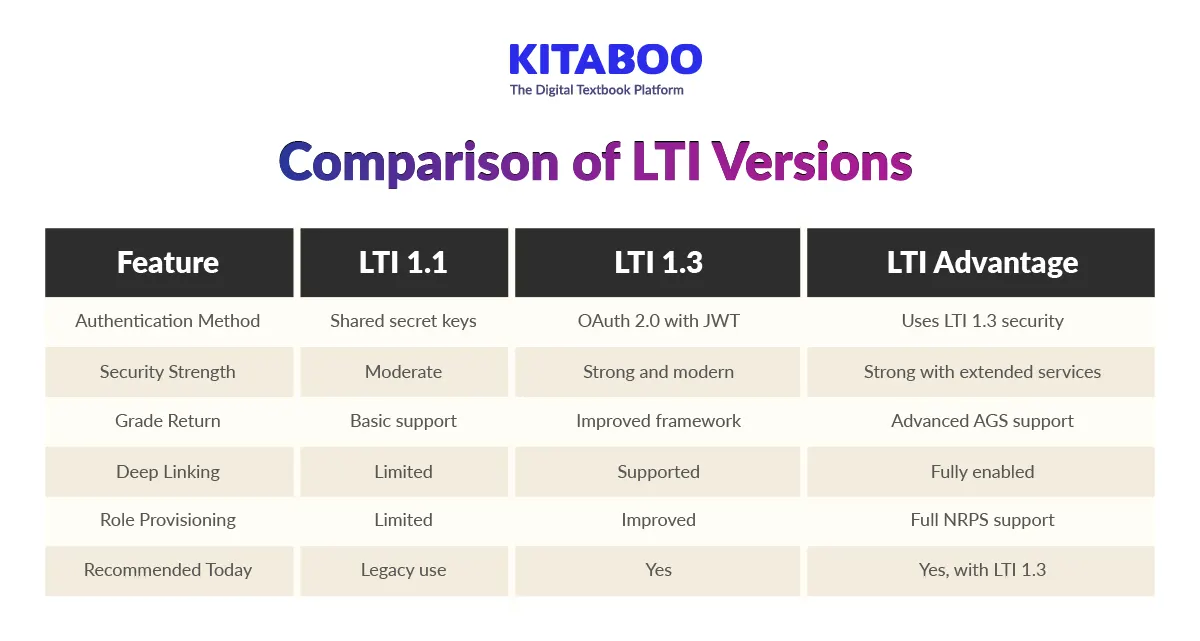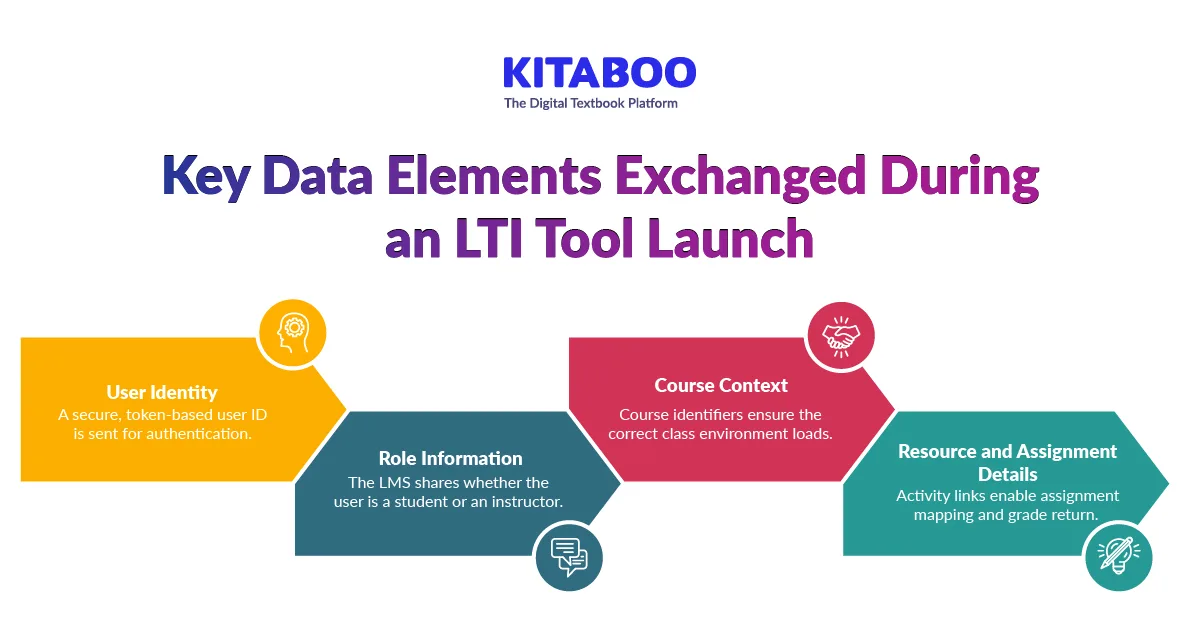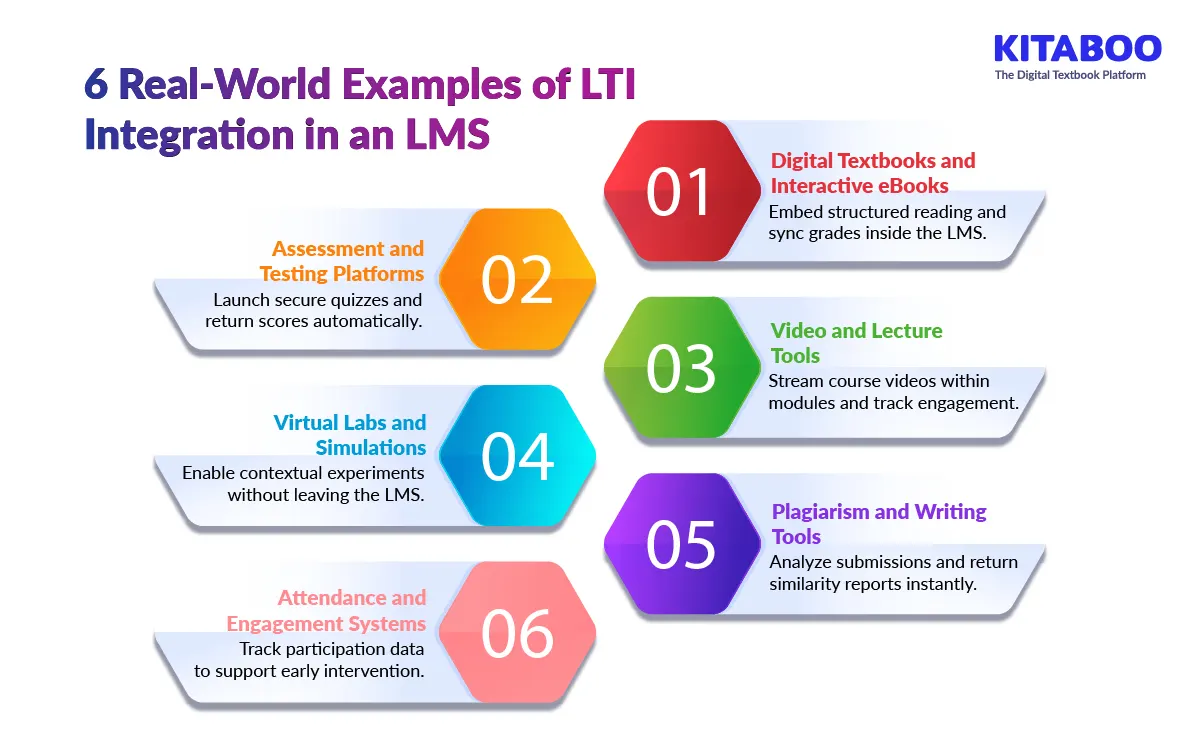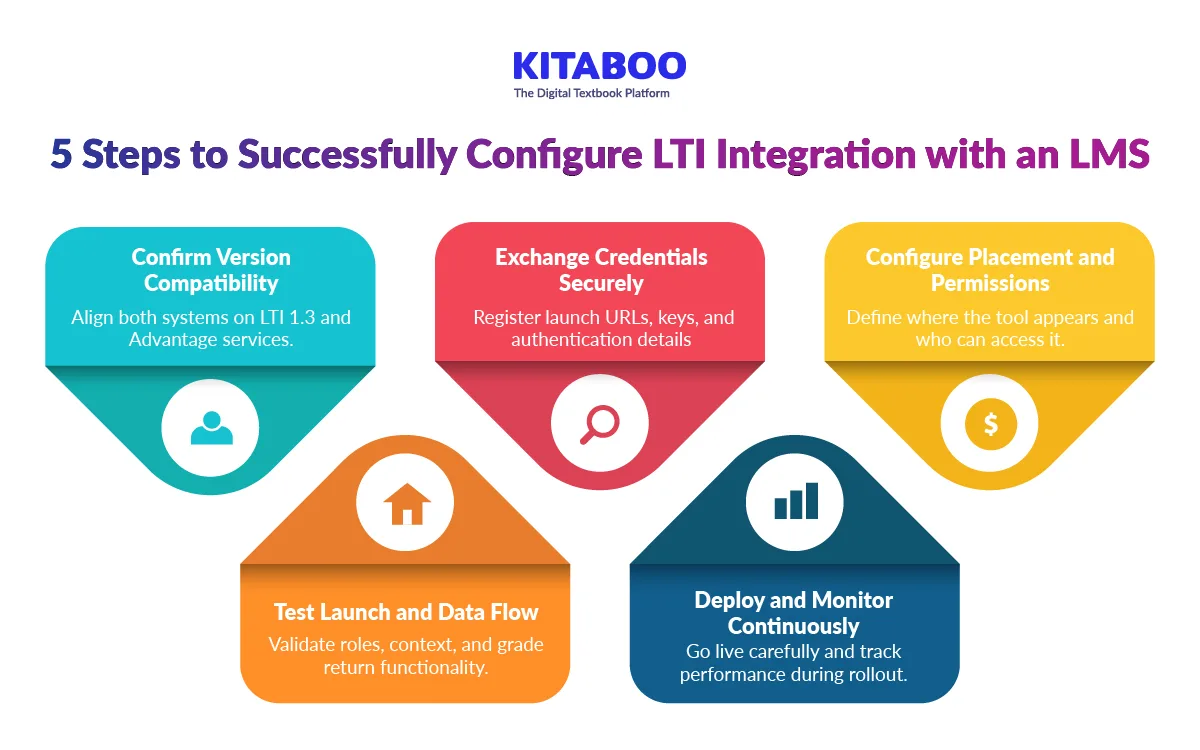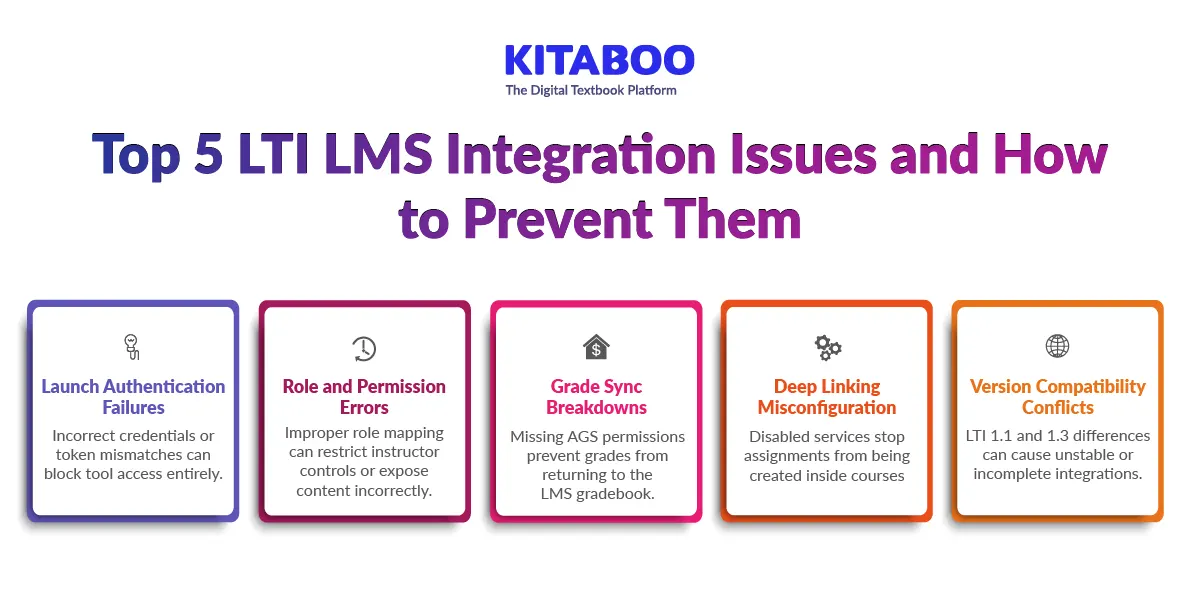
LTI LMS Integration: Meaning, Examples, and How LTI Standards Support eBooks in an LMS
Summarize this blog with your favorite AI:
LTI LMS Integration – TL;DR
LTI integrations create a secure bridge between external tools and an LMS. They allow single sign-on, role mapping, and automatic grade return. Modern standards such as LTI 1.3 and LTI Advantage improve security and expand services. For institutions, edtech providers, and digital publishers, strong LTI LMS integration ensures stable and scalable deployment.
When implemented correctly, LTI in a learning management system reduces technical friction. It supports seamless eBook launches, analytics visibility, and structured data exchange. Proper setup, version alignment, and troubleshooting practices are essential. A reliable integration partner ensures long-term performance and adoption.
LTI LMS Integration at a Glance:
| Area | What it Covers | Why it Matters |
|---|---|---|
| Core Function | Secure launch between LMS and external tool | Enables seamless user access |
| Versions | LTI 1.1, LTI 1.3, LTI Advantage | Improves security and service capabilities |
| Data Shared | User identity, roles, course context, grades | Supports personalization and reporting |
| Key Services | Deep Linking, NRPS, AGS | Automates content placement and grade sync |
| Setup & Support | Configuration, credentials, version alignment | Prevents launch and grade errors |
| Use Case | eBooks, assessments, analytics tools | Drives adoption inside LMS environments |
If you manage an LMS, you already know one thing: no single system can do everything well. You depend on digital textbooks, assessments, video tools, and analytics platforms. Each tool serves a specific academic purpose.
But how do these tools function inside your LMS securely? How do they share context without separate logins? This is where LTI integrations become important. In this blog, we will explore how LTI integrations work and why they matter.
Table of Contents
- What is LTI?
- What is LTI Integration?
- What Are the Roles of Platform and Tool Provider in LTI LMS Integration?
- What Are the Different LTI Versions: LTI 1.1 vs LTI 1.3 vs LTI Advantage?
- How Does LTI LMS Integration Work Behind the Scenes?
- What Data is Shared During an LTI Launch?
- What Does LTI Advantage Add to LTI LMS Integration?
- What Are the Most Common Examples of LTI Integration in an LMS?
- What Are the Benefits of LTI LMS Integration for Educators, Institutions, and Publishers?
- How Do You Set Up LTI Integration with an LMS?
- What Are the Most Common LTI LMS Integration Issues and How Can You Fix Them?
- Conclusion
- FAQs
- Summary
What is LTI?
To understand the meaning of LTI integration, we must first define LTI itself. LTI stands for Learning Tools Interoperability. It is a technical standard developed to help systems communicate securely.
The goal of LTI integrations is simple. They create a common framework for connecting external tools to an LMS. Instead of building custom code for each vendor, institutions follow a shared standard.
When implemented correctly, LTI in a platform creates structured interoperability. It ensures secure launch, identity transfer, and contextual access. This foundation makes expansion inside an LMS predictable and scalable.
What is LTI Integration?
Now, let us move from the standard to the implementation. LTI integration refers to the actual process of connecting a tool to an LMS using LTI standards. This is where configuration, authentication, and launch workflows are set up.
LTI integration with an LMS allows a tool to open inside a course page. The learner does not need a separate login. The system passes identity and course context automatically.
In practice, examples of LTI LMS integration include digital textbooks, assessment engines, and interactive eBook platforms embedded within courses. The user experience feels seamless because the LMS and tool communicate behind the scenes.
This is what makes LTI in a learning management system operational rather than theoretical. It turns a standard into a working connection that supports secure and structured LTI learning environments.
What Are the Roles of Platform and Tool Provider in LTI LMS Integration?
To understand how LTI LMS integration works, you must know the two roles involved. Every LTI connection includes a platform and a tool provider. These roles define responsibility, security control, and data flow.
The Platform in an LTI Environment
The platform is usually the LMS. It initiates the launch request when a user clicks a tool link. It authenticates the user and sends contextual information securely.
In LTI in a learning management system, the platform controls access boundaries. It decides which users can launch the tool. It also determines what course context is shared. This ensures structured and permission-based interaction.
The platform does not host the external content. It acts as the trusted entry point. This separation keeps governance centralized while enabling scalable LTI integrations.
The Tool Provider in LTI
The tool provider is the external application. It could be a digital textbook platform, assessment engine, or interactive content system. It receives the launch request and validates it.
During LTI integration with an LMS, the tool verifies authentication tokens. It then loads the correct user experience based on the received data. This may include role, course ID, or assignment details.
The tool provider focuses on delivering specialized functionality. It does not manage institutional enrollment or course structures. This clear division makes LTI learning environments modular and efficient.
Platform vs Tool Provider in LTI LMS Integration
| Component | Platform (LMS) | Tool Provider (External Tool) |
|---|---|---|
| Primary Role | Initiates and manages the LTI launch | Delivers specialized learning functionality |
| Authentication | Authenticates users before launch | Validates tokens received from the platform |
| Data Handling | Sends user, role, and course context | Uses received context to personalize content |
| Access Control | Controls permissions and enrollment boundaries | Does not manage institutional enrollment |
| Core Focus | Governance, security, and course structure | Content delivery, assessments, and interactivity |
What Are the Different LTI Versions: LTI 1.1 vs LTI 1.3 vs LTI Advantage?
Understanding LTI integrations requires clarity on version evolution. Not all implementations offer the same security or functionality. Version choice directly impacts how LTI LMS integration performs in real-world environments.
LTI 1.1
LTI 1.1 was widely adopted in early deployments. It relied on shared secret keys between the LMS and the tool. Authentication worked but lacked modern token-based safeguards.
Security in 1.1 depended on static credentials. If secrets were exposed, risk increased significantly. Many institutions still operate 1.1, but upgrades are encouraged.
LTI 1.3
LTI 1.3 introduced modern security architecture. It uses OAuth 2.0 and JSON Web Tokens for authentication. This strengthens identity validation during tool launch.
In LTI in a learning management system, version 1.3 improves protection and compliance. It removes reliance on shared secrets. Institutions prefer it for secure and scalable deployments.
LTI Advantage
LTI Advantage builds on LTI 1.3. It is not a separate core version. It adds advanced service layers to enhance functionality.
These services include Deep Linking, Names and Role Provisioning, and Assignment and Grade Services. They expand what LTI integration with an LMS can accomplish. For example, tools can create assignments and return grades automatically.
When evaluating versions, institutions should prioritize LTI 1.3 with LTI Advantage. This combination supports secure and feature-rich LTI learning environments.
How Does LTI LMS Integration Work Behind the Scenes?
The LTI LMS integration process follows a particular launch sequence. The process is structured and security-driven. Each step ensures trust between the LMS and the external tool.
Launch Initiation
The process begins when a user clicks a tool link. The LMS acts as the platform and initiates the request. This request contains signed authentication details.
In LTI in a learning management system, this launch preserves user context. The learner remains inside the course interface. No additional login screen interrupts the workflow.
Authentication and Token Exchange
The platform generates a secure token during launch. This token confirms identity and request validity. The tool provider verifies this token before granting access.
This step is critical in LTI integrations. It prevents unauthorized access attempts. Security depends on trusted token validation rather than simple URL redirects.
Context and Role Transmission
After authentication, the LMS sends contextual data. This may include user role, course ID, and resource link identifiers. The tool uses this information to load the correct experience.
During LTI integration with an LMS, context defines personalization. An instructor sees administrative controls. A student sees learning content only.
Secure Tool Launch
Once validation is complete, the tool loads inside the LMS frame. The experience feels native to the course environment. Communication continues through secure service endpoints.
This structured flow makes LTI learning scalable and reliable. It allows institutions to embed advanced tools without breaking security or user continuity.
What Data is Shared During an LTI Launch?
Every LTI launch carries structured information. This data allows the tool to function inside the LMS context. In LTI LMS integration, data sharing is controlled and standards-driven.
User Identity Information
The LMS sends a unique user identifier during launch. This identifier does not always include personal details. It ensures the tool recognizes the correct learner or instructor.
In secure LTI integrations, identity data is token-based. The tool validates the token before granting access. This prevents unauthorized impersonation attempts.
Role and Permissions
The LMS also sends the user’s role. This may be student, instructor, or administrator. The tool uses this role to define interface permissions.
In LTI in a learning management system, role clarity is critical. Instructors may create assignments or view analytics. Students receive access limited to learning content.
Course and Context Details
Course identifiers are included in the launch payload. This tells the tool which course environment is active. It allows the correct resources to load.
During LTI integration with an LMS, context prevents cross-course confusion. A student in one class cannot access another course’s materials. Context ensures academic boundaries remain intact.
Resource Link and Assignment Data
When applicable, the LMS sends resource link identifiers. These links connect specific assignments or activities. They allow grade return services to function properly.
This structured exchange makes LTI learning environments reliable. The tool receives only what is necessary to operate. Excess data sharing is avoided to protect privacy and compliance.
What Does LTI Advantage Add to LTI LMS Integration?
Basic launch capability is not enough for modern digital learning. Institutions need structured services beyond authentication. This is where LTI Advantage strengthens LTI LMS integration.
Deep Linking
Deep Linking allows instructors to select specific resources inside a tool. They can embed chapters, assessments, or activities directly into a course. This eliminates manual URL copying and configuration errors.
In advanced LTI integrations, Deep Linking streamlines content placement. An instructor can map an eBook chapter to a weekly module. This makes content integration structured rather than generic.
Names and Role Provisioning Services (NRPS)
NRPS allows the tool to retrieve course roster information securely. The tool can access names and role details when permitted. This reduces manual user provisioning inside external platforms.
In LTI in a learning management system, roster synchronization improves operational efficiency. Enrollment changes reflect automatically inside the tool. This reduces administrative overhead and access mismatches.
Assignment and Grade Services (AGS)
AGS enables grade return from the tool to the LMS. When a student completes an assessment, scores can sync automatically. This eliminates manual grade uploads.
During LTI integration with an LMS, AGS ensures assessment continuity. Instructors view grades within the LMS gradebook. This supports seamless academic workflows and structured LTI learning environments.
LTI Advantage transforms basic connectivity into service-driven interoperability. It enables secure, scalable, and academically integrated tool deployment.
What Are the Most Common Examples of LTI Integration in an LMS?
The real value of LTI integrations becomes clear in practical use cases. Institutions rely on external tools for specialized functionality. These tools operate seamlessly through structured LTI LMS integration.
Publishers often embed digital textbooks inside courses. Students access chapters directly within the LMS interface. No separate login interrupts the learning flow.
Through LTI integration with an LMS, reading progress and assessments remain contextual. With LTI Advantage services, grades can sync automatically. This creates a structured academic experience.
Assessment and Testing Platforms
Assessment engines integrate through LTI for secure exam delivery. Students launch quizzes without leaving the LMS. Authentication ensures the correct learner identity.
In advanced LTI in a learning management system, grade return is automated. Instructors view scores inside the LMS gradebook. This reduces manual entry and grading errors.
Video and Lecture Platforms
Video platforms integrate to deliver hosted lectures. Students launch videos inside course modules. Viewing data may sync back for engagement tracking.
These are strong examples of LTI integration supporting blended learning. The LMS remains the central access point. External hosting handles performance and streaming.
Virtual Labs and Simulation Tools
STEM courses often require simulation environments. Virtual labs integrate through LTI for contextual access. Students perform experiments without external navigation.
Such integrations support advanced LTI learning environments. They expand LMS capabilities without overloading its architecture.
Plagiarism Detection and Writing Tools
Writing tools integrate to support academic integrity workflows. Students submit assignments through the LMS. The tool analyzes content for originality.
Through structured LTI LMS integration, results return automatically. Instructors view similarity reports inside the course environment. This streamlines evaluation processes.
Attendance and Engagement Tracking Systems
Some institutions use engagement analytics platforms. These tools track participation across activities. Data helps identify at-risk learners early.
With LTI integration with an LMS, engagement metrics stay contextual. Administrators gain insights without separate dashboards. This improves academic intervention strategies.
What Are the Benefits of LTI LMS Integration for Educators, Institutions, and Publishers?
The impact of LTI LMS integration extends beyond technical connectivity. It reshapes how digital tools function within academic workflows. When implemented correctly, LTI integrations create operational, instructional, and commercial value.
Benefits for Educators
Educators gain a unified teaching environment. They can embed tools directly into course modules. Students access resources without leaving the LMS.
In LTI in a learning management system, grade return simplifies evaluation. Assessment results sync automatically into the gradebook. This reduces manual work and administrative errors.
Deep Linking also improves content structuring. Instructors can map specific chapters or activities to lessons. This makes digital content instructionally aligned rather than loosely attached.
Benefits for Institutions
Institutions gain scalability and governance control. New tools can be deployed without rebuilding infrastructure. This reduces long-term technical overhead.
With standardized LTI integrations, vendor onboarding becomes predictable. Security frameworks remain consistent across tools. Compliance requirements are easier to manage.
Centralized authentication also improves user experience. Students use one institutional login. This strengthens system-wide adoption and reduces support tickets.
Benefits for Publishers and EdTech Providers
For publishers, LTI integration with an LMS increases product adoption. Content becomes part of the course workflow. It is no longer an external resource.
Grade return and roster synchronization improve usage visibility. Publishers gain contextual analytics from structured LTI learning environments. This supports product refinement and institutional partnerships.
When tools function natively within the LMS, retention improves. Institutions prefer solutions that integrate seamlessly. Strong integration directly supports long-term commercial growth.
How Do You Set Up LTI Integration with an LMS?
Setting up LTI LMS integration requires coordination between the LMS administrator and the tool provider. The process follows a structured configuration sequence. Each step ensures secure and functional LTI integrations.
Confirm LTI Version Compatibility
First, verify which LTI version both systems support. Most institutions should prioritize LTI 1.3 with Advantage services. Version mismatch can cause launch failures later.
This step prevents configuration rework. It also ensures modern security standards are followed. Clear version alignment is foundational to successful LTI integration with an LMS.
Exchange Credentials and Configuration Details
The LMS administrator creates a developer key or registration entry. The tool provider supplies launch URLs and public keys. These credentials establish trust between systems.
In secure LTI in a learning management system, authentication relies on token validation. Proper key exchange prevents unauthorized launch attempts. Accuracy at this stage avoids downstream issues.
Configure Tool Placement and Permissions
Next, define where the tool appears in the LMS. It may be placed in course navigation or assignments. Permission settings determine who can launch it.
This step shapes the instructional workflow. Instructors should test visibility before student access. Controlled placement improves adoption and usability.
Test Launch and Data Exchange
Before going live, conduct structured testing. Launch the tool as both instructor and student. Verify role transmission, context accuracy, and grade return.
Testing validates that LTI integrations function as expected. It confirms that authentication and service endpoints operate correctly. Skipping testing increases support risks.
Deploy and Monitor Performance
After validation, enable access institution-wide. Monitor early launches for errors or latency issues. Collect feedback from instructors during initial rollout.
Ongoing monitoring strengthens long-term stability. Successful LTI LMS integration depends on continuous validation, not one-time setup. Regular review ensures scalable and reliable deployment.
What Are the Most Common LTI LMS Integration Issues and How Can You Fix Them?
Even mature LTI LMS integration setups can fail under pressure. When issues occur, they affect teaching continuity and learner access. Small configuration errors can escalate into institutional disruption.
Launch Failures and Authentication Errors
A failed launch is one of the most disruptive issues. Students click a resource and see an error page. This breaks lesson flow and creates immediate support tickets.
In most cases, authentication keys or redirect URLs are misconfigured. Token validation may fail silently in the background. In secure LTI integrations, even minor mismatches block access completely.
Administrators should verify client IDs and public keys carefully. Logs must be reviewed to trace token rejection causes. Early-stage testing reduces live classroom interruptions.
Role and Permission Mismatches
Role errors create functional confusion inside tools. Instructors may lose grading permissions unexpectedly. Students may gain access to restricted administrative views.
In LTI in a learning management system, role mapping controls tool behavior. If the LMS sends incorrect role parameters, features may malfunction. This affects assignment creation and roster visibility.
Administrators should test launch as different user types. Confirm role parameters align with tool expectations. Clear documentation prevents recurring misconfigurations.
Grade Return Not Syncing
Grade synchronization failures create academic risk. Instructors may assume grades were recorded correctly. Students may dispute missing scores later.
During LTI integration with an LMS, AGS permissions must be enabled explicitly. Missing scopes prevent grade transmission. Without validation, silent failures remain undetected.
Institutions should conduct controlled grade return tests. Confirm assignment mapping matches LMS identifiers. Routine validation protects grading integrity.
Deep Linking Configuration Errors
Deep Linking errors disrupt content structuring. Assignments may not attach properly to modules. Instructors may resort to manual URL workarounds.
When LTI Advantage services are incomplete, linking fails. Resource link IDs may not persist correctly. This reduces workflow efficiency and increases manual correction.
Enable services fully before course deployment. Train instructors on correct linking procedures. Structured onboarding reduces setup friction.
Version Compatibility Conflicts
Mixed version environments create unpredictable behavior. A tool built for LTI 1.3 may not function under 1.1. Security models differ significantly across versions.
Inconsistent version support weakens system reliability. Authentication methods differ between legacy and modern standards. This can cause partial launches or broken grade services.
Before expanding LTI LMS integration, confirm version compatibility clearly. Audit legacy deployments regularly across departments. Planned upgrades reduce instability and long-term integration risks.
Conclusion
LTI has reshaped how digital tools connect with learning platforms. It enables secure, structured, and scalable integration across systems. When implemented correctly, it strengthens teaching workflows and data visibility.
Strong LTI integrations reduce friction between content and instruction. They simplify access, automate grade return, and improve user experience. Institutions gain operational efficiency and technical stability.
For publishers and edtech providers, LTI LMS integration must be reliable and future-ready. KITABOO delivers seamless LTI integration with an LMS, including LTI Advantage services and secure content delivery. If you are evaluating integration partners, request a demo and see KITABOO in action.
FAQs
Summary
This blog explained the meaning of LTI integration and its role in modern education. LTI enables secure and standardized connections between external tools and learning management systems. It defines how platforms and tool providers exchange identity, roles, and course context during launch.
Modern versions such as LTI 1.3 and LTI Advantage strengthen security and expand services like Deep Linking and grade return. Clear version alignment and proper configuration ensure stable and scalable integrations.
Effective LTI LMS integration supports seamless eBook access, automated grade synchronization, and structured data exchange. Institutions benefit from reduced friction and improved instructional workflows.
Publishers gain deeper LMS adoption and measurable engagement insights. When implemented correctly, LTI creates a reliable foundation for secure, connected digital learning ecosystems.
Discover how a mobile-first training platform can help your organization.
KITABOO is a cloud-based platform to create, deliver & track mobile-first interactive training content.

